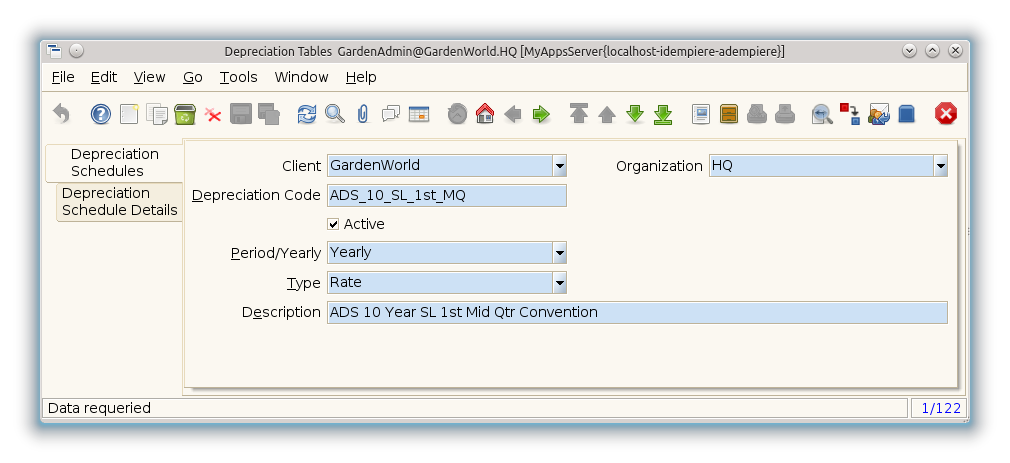Depreciation Tables (Window ID-53059)
Window: Depreciation Tables
Description: Allows users to create multiple depreciation schedules
Help: null
TAB: Depreciation Schedules
Description: null
Help null
| Name | Name | Description | Help | Specifications |
|---|---|---|---|---|
| Client | Client | Client/Tenant for this installation. | A Client is a company or a legal entity. You cannot share data between Clients. Tenant is a synonym for Client. | AD_Client_ID numeric(10) NOT NULL Table Direct |
| Organization | Organization | Organizational entity within client | An organization is a unit of your client or legal entity - examples are store, department. You can share data between organizations. | AD_Org_ID numeric(10) NOT NULL Table Direct |
| Depreciation Code | Depreciation Code | null | null | A_Depreciation_Table_Code character varying(20) NOT NULL String |
| Active | Active | The record is active in the system | There are two methods of making records unavailable in the system: One is to delete the record, the other is to de-activate the record. A de-activated record is not available for selection, but available for reports.
There are two reasons for de-activating and not deleting records: (1) The system requires the record for audit purposes. (2) The record is referenced by other records. E.g., you cannot delete a Business Partner, if there are invoices for this partner record existing. You de-activate the Business Partner and prevent that this record is used for future entries. |
IsActive character(1) NOT NULL Yes-No |
| Period/Yearly | Period/Yearly | null | null | A_Term character varying(2) NOT NULL List |
| Type | Type | null | null | A_Table_Rate_Type character varying(2) NOT NULL List |
| Description | Description | Optional short description of the record | A description is limited to 255 characters. | Description character varying(510) NOT NULL String |
TAB: Depreciation Schedule Details
Description: null
Help null
File:Depreciation Tables - Depreciation Schedule Details - Window (iDempiere 1.0.0).png
| Name | Name | Description | Help | Specifications |
|---|---|---|---|---|
| Client | Client | Client/Tenant for this installation. | A Client is a company or a legal entity. You cannot share data between Clients. Tenant is a synonym for Client. | AD_Client_ID numeric(10) NOT NULL Table Direct |
| Organization | Organization | Organizational entity within client | An organization is a unit of your client or legal entity - examples are store, department. You can share data between organizations. | AD_Org_ID numeric(10) NOT NULL Table Direct |
| Depreciation Code | Depreciation Code | null | null | A_Depreciation_Table_Code character varying(20) NOT NULL String |
| Period/Yearly | Period/Yearly | null | null | A_Period numeric(10) NOT NULL Integer |
| Type | Type | null | null | A_Table_Rate_Type character varying(2) List |
| Rate | Rate | null | null | A_Depreciation_Rate numeric NOT NULL Number |
| Active | Active | The record is active in the system | There are two methods of making records unavailable in the system: One is to delete the record, the other is to de-activate the record. A de-activated record is not available for selection, but available for reports.
There are two reasons for de-activating and not deleting records: (1) The system requires the record for audit purposes. (2) The record is referenced by other records. E.g., you cannot delete a Business Partner, if there are invoices for this partner record existing. You de-activate the Business Partner and prevent that this record is used for future entries. |
IsActive character(1) NOT NULL Yes-No |

